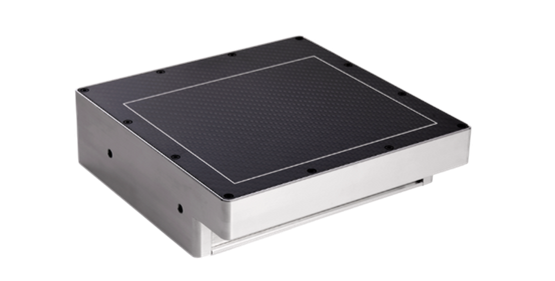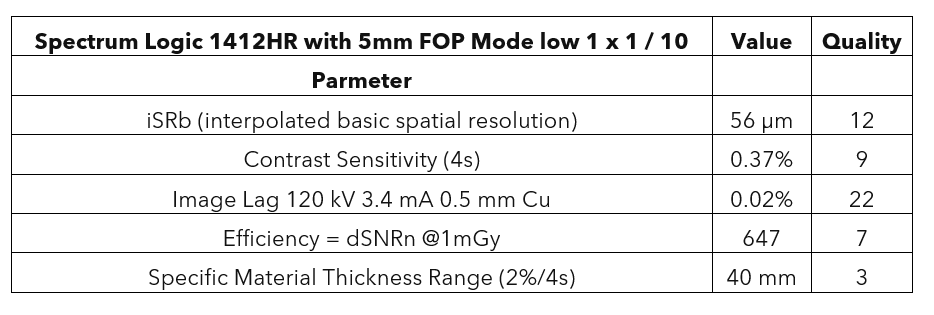Western Blotting is a biochemical process, used by scientists and researchers, to specify proteins within complex samples. A western blot imager is an effective device to monitor changes in proteins, focusing on expression and modifications. Discerning and qualifying proteins amongst multiple cell lines is central to the study of cellular proteins. Conventional western blot imagers can provide this data, however multiple takes and numerous time-consuming calibrations may be necessary to achieve this. Existing Western Blot imaging systems can be bulky, expensive and have poor sensitivity, because they use either scanning line sensors or lens-coupled CCDs. In this post we compare CMOS image sensors to conventional techniques - X-ray film and cooled lens coupled CCD …
Read MoreSpectrum Logic to exhibit at Control 2024
Spectrum Logic will be exhibiting at Control 2024 - the international trade fair for quality assurance (23-26 April 2024) at Messe Stuttgart. We will be showcasing our high resolution, high sensitivity CMOS X-ray detectors for non-destructive testing and quality assurance. Location: Hall 10 booth 1411.
Spectrum Logic presentation at NEPCON 2024
Spectrum Logic’s Takahisa Yamane will be presenting at NEPCON 2024 at 11am on 26th January
Read MoreCMOS Detectors for Pipe Weld Inspection
“Welding is a fabrication process whereby two or more parts are fused together by means of heat, pressure or both, forming a join as the parts cool” TWI Global
Welding plays a vital role in the oil and gas industry. Every part of oil and gas production process (Upstream, Midstream and Downstream) is dependent on robust, reliable welds. The industry has a wide range of welding requirements, from small diameter pipes to enormous rigs and platforms.
Definition of upstream, midstream and downstream segments in oil and gas industry
https://www.omsmeasure.com/guide-to-weld-inspection
Pipe Weld Inspection plays a crucial role in preventative maintenance and asset protection within the world of Oil and Gas. Non-destructive testing (NDT) technicians, plant owners and pipe manufacturers use X-ray to find hidden flaws. They are checking for:
· corrosion
· erosion
· weld quality
· wall thickness
· clogging
Digital X-ray detectors allow NDT of pipelines in the field and factory. Spectrum Logic has developed radiation hardened, light weight, X-ray detectors with excellent image quality to assist with the inspection process.
PIpe Weld X-ray
This pipe weld X-ray image was taken with the Spectrum Logic 1510HS detector.
This lightweight (0.8kg) CMOS X-ray detector was placed on a rotating gantry on the outside of a 36-inch OD steel pipe with a wall thickness of 0.666 inches. The X-ray source used an energy of 225kV.
1510HS CMOS X-ray Detector
The Spectrum Logic 1510HS detector has an industry leading thickness of 9mm, making it ideal for imaging hard to access objects, such as heat exchangers. It is a dynamic X-ray detector, with a pixel pitch of 100μm and a Gadox scintillator. It is ideal for portable applications and weld inspection. The USB 3 interface handles data output, control and power supply. A handle can be attached for manual operation. Automatic exposure control (AED) allows the detector to be used with a portable source without synchronisation.
Weld image taken using 1510HS (Courtesy of Visiconsult)
Other pipe weld images taken with our 1510HS CMOS X-ray Detectors:
Weld image taken using 1510HS (Courtesy of Visiconsult)
Another Spectrum Logic detector which is suitable for pipe weld inspection is 1412HR detector (with high resolution CsI Scintillator). The 1412HR was evaluated by Visiconsult X-ray Systems and Solutions.
Spectrum Logic 1412HR
The aim of the Visiconsult evaluation was to find out how the Spectrum Logic 1412HR detector measured up to the DIN EN ISO 17636-2 standard. This ISO (International Organization for Standardization) standard is for ‘non-destructive testing of welds — Radiographic testing — Part 2: X- and gamma-ray techniques with digital detectors’. The 1412HR detector is a dynamic X-ray detector suitable for pipe weld inspection, with a pixel pitch of 50μm and innovative sensor design which enables a frame rate of up to 29 fps and a programmable region of Interest (ROI) gives higher frame rates, for example with an ROI of 2804 × 1200 pixels can be read out at 58 frames per second. For the Visiconsult evaluation the detector was operated in its most sensitive mode and the aim was to discover how it achieved Class-B under challenging circumstances in a short space of time.
1412HR Evaluation Set up
Results:
· Due to the detector’s high resolution (50μm) there is a good contrast-to-noise ratio (SNR)
· Class A and B (according to ISO17636-2) can be achieved, without compensation, up to a wall thickness of 15mm.
(Test result image courtesy of Visiconsult)
ASTM 2597 results using 1412HR 5 mm FOP
For this evaluation Customer 2 tested our 1412HR detector against the ASTM 2597 Standard Practice for Manufacturing Characterization of Digital Detector Arrays.
Results from repeated measurement with 5mm FOP and optimised gain setting.
These tests were conducted with >1sec exposure time due to acquisition constraints, some results are prone to high leakage. Better Signal to Noise Ratio (SNR) is achieved when exposure time is reduced to 500ms or less.
Conclusion
Spectrum Logic has developed radiation hardened, light weight, portable X-ray detectors with excellent image quality to assist with the pipe weld inspection process. Customer evaluations have shown that Spectrum Logic meet ISO and ASTM standards for use in the inspection process.
The HR family of detectors is particularly suitable as it features a 50um pixel pitch and radiation hard FOP which is ideal for weld inspection because the FOP ensures a high level of radiation tolerance and the small pixel provides high spatial resolution.
For more information contact us at inquiries@spectrumlogic.com or join us at ASNT 2023 (23-26 October) in Houston booth 316.















